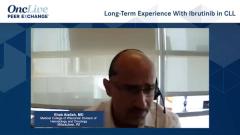
Mitigating Toxicities Associated With BTK Inhibitors
A continuing discussion about the implications of toxicities with BTK inhibitors.
Episodes in this series

Nicole Lamanna, MD: Thankfully, because we have second-generation BTK [Bruton tyrosine kinase] inhibitors, we can challenge our patient, and if they have an adverse effect on ibrutinib, we have data with both acalabrutinib and zanubrutinib that you can try to challenge them rather than exhaust that pathway. It’s important before going on to a different therapy. There’s no doubt that all the BTK inhibitors might have them, even if the second generation might have less frequency of the grade 3 or 4 toxicities. For a patient, if they’re grade 1 or 2 but are having diarrhea all the time, they might be more willing to change therapies, because it really impacts their quality of life. Unfortunately, despite the selectivity, there are still some adverse events that we’re going to see with the BTK inhibitors that can be nagging to patients.
Dr Atallah, the once-a-day and twice-a-day dosing is a big deal for some of our patients, or the interactions with PPIs [proton pump inhibitors] and things like that. For those patients who are doing well on ibrutinib, they’re probably going to stay on ibrutinib. As Dr [Jennifer] Woyach noted, a lot of the adverse effects do get better over time. But for other patients starting a second-generation BTK inhibitor going forward, if they’ve never been on a BTK inhibitor, given some of these data, it will probably come to light. We were all hoping for a bigger difference between the direct comparisons, but it is what it is.
William Wierda, MD PhD: Steve, maybe you can comment. Are these data consistent with what your experience has been? I assume you’ve had access to both drugs. Can you can comment on whether you have a preference for 1 over another and what situations drive that preference?
Steven Coutre, MD: Sure. I have longtime experience with both drugs. It’s important to remember the main reason people progress after a BTK inhibitor is not because of resistance. The longest datum we have is with ibrutinib, and that number is probably around 10% over all these years, which is remarkable. I imagine it’s probably going to be similar for other BTK inhibitors. It points out the importance of managing adverse effects and knowing what to expect and when to worry. If I use an up-front BTK inhibitor, I tend to use ibrutinib. I have the longest experience with it and know what to expect. I do think the cardiovascular signal is different, along with hypertension and atrial fibrillation, between ibrutinib and the other 2 drugs we’ve discussed, but most patients don’t get those after all. I’m willing to go with what I have the most experience with.
The way I put it to patients when I’m starting this discussion is that we’ve got a lot of options, and they’re all great and are going to work. What’s better than that? That starts the conversation of time-limited therapy, continuous therapy, etc. It’s also great that we have a class of drugs, so if a patient doesn’t tolerate 1, as John mentioned, maybe another 1 is better for you. It’s always going to be that way. The important thing is knowing how to manage these and making sure our patients are aware of what adverse effects they may experience.
William Wierda, MD PhD: I’m going to ask the same question to Ehab, and then I want to ask Jennifer about her perspective on the ALPINE study, which is being reported at EHA [European Hematology Association Congress]. Ehab, do you have a preference in terms of your options for BTK inhibitors? What drives that preference?
Ehab Atallah, MD: With the data for acalabrutinib with the less arthralgia, atrial fibrillation, and bleeding, I’ve recently been shifting a little more to acalabrutinib, taking into account compliance more than anything else. There’s about a 10% difference of atrial fibrillation. I’ll take that. I’ve been moving a little more toward acalabrutinib recently.
What’s also not very clear from the data overall are dose adjustments for ibrutinib. Do we really need the full dose? There are some data—I believe Jennifer published them—that a lower dose is not good for you and affects outcome for ibrutinib. But I wonder if a lower dose of ibrutinib once patients have a good response is something you all do or consider for your patients.
William Wierda, MD PhD: Let me ask you another question. Do you have experience in patients who may have been on ibrutinib and have some intolerable adverse effect or toxicity and you’re interested in staying in target but switching them to acalabrutinib, for example? What has been your experience with that strategy? Do you still see toxicity with the alternative irreversible BTK inhibitor?
Ehab Atallah, MD: I do have some experience staying in the class, but not a ton of experience specifically related to the arthralgia and joint pain. I have switched less than a handful of patients because of the arthralgia and, whether placebo or not, it worked. They did feel better.
William Wierda, MD PhD: There are some consistent toxicities that we see. There’s an increased risk for bleeding, etc. We still see some of those when we switch therapy, but that’s also been my experience. With arthralgias or myalgias, or if a patient has started on acalabrutinib and has a headache and can’t tolerate that, I have switched patients to ibrutinib and have not had a problem with headache.
TRANSCRIPT EDITED FOR CLARITY






















































